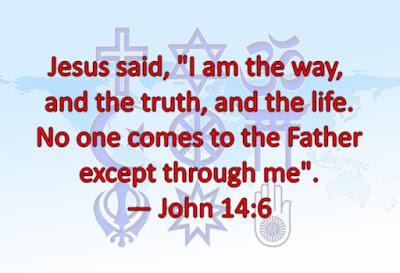In matters of sharing our faith in accordance with Jesus' command (Matt. 28:18-20, Acts 1:8), we need to take a thoughtful approach. First of all, we must remember that we are not the ones who are doing the saving with our own brilliant arguments, that's the work of the Holy Spirit (1 Cor. 2:1-5). That's why people come to Christ through simple one-on-one evangelism from an excited new convert who is unskilled in theology and philosophy.
People have pointed to Peter's sermon in Acts 2:14-41 as a model for evangelism, but that message was given to monotheistic Jews. For people who have different religions such as paganism, atheism, evolutionism, Mohammedanism, Hinduism, cults that claim to be Christian, and others, a different approach is needed. A good working knowledge of their worldview is very important to establish communication. People who engage in serious debates take the time to learn where the other is coming from.
At The Question Evolution Project, we had bully who was engaging in spam, prejudicial conjecture and other logical fallacies. When I called him out on them, he replied, "You call it 'bigotry, prejudicial conjecture, falsehood, spam', I call it truth." In the above image (a further reply to my rebuke), you can see the bigotry and prejudicial conjecture quite plainly. Further, he arbitrarily decided to create his own "truth" based on his preferences. He had said earlier that he wanted to have "discussions", but that was obviously false based on his conduct. The point is that he had no interest in knowing what biblical creationists actually believe and teach, but wanted to express his own uninformed opinions (Prov. 18:2 ESV).
I'm not saying that we need to have encyclopedic knowledge of other worldviews, that would be ridiculous. However, when having discussions with people, we can be prepared for some of the more common belief systems, and do some homework when having planned discussions with people.
When attempting to reach the lost for Jesus Christ, we need to know our own theology. From there, we must have Christ-honoring apologetics, which includes having some familiarity with the other person's worldview — even though few want to extend the same approach to us.
 |
| Modified from an image on Pixabay by geralt |
 |
| Used under Fair Use provisions for educational purposes |
I'm not saying that we need to have encyclopedic knowledge of other worldviews, that would be ridiculous. However, when having discussions with people, we can be prepared for some of the more common belief systems, and do some homework when having planned discussions with people.
When attempting to reach the lost for Jesus Christ, we need to know our own theology. From there, we must have Christ-honoring apologetics, which includes having some familiarity with the other person's worldview — even though few want to extend the same approach to us.
Before looking at Acts 17, it is important to understand the origin of religion; in order to know the meaning of anything, we have to understand its origin. The origin of religion began in the Garden of Eden when God clearly revealed himself to Adam. However, Adam and Eve rejected that revelation and chose to believe a falsehood about Him. In this act of disobedience, they chose to follow Satan’s worldview over God’s worldview (Genesis 3:4–5). They created the first human religion, rejecting God’s perfect and true religion.To read the rest in context, click on "Exposing the Underlying Worldview: Acts 17".
Adam’s disobedience had consequences for the rest of his descendants since it affected how they viewed God and creation. This can be seen at the event of the Tower of Babel, which was the beginning of the religious diversity we see in the world today (see Deuteronomy 32:8, 16–17, 21). At the Tower of Babel, monotheism devolved into polytheism, pantheism, and the worship of anything other than the one true, living God. When the people were dispersed at Babel, they would have taken with them a hybrid truth of the living God mixed with the twisting and distorting of the truth of that revelation about Him (Romans 1:18–32). Religion then is first of all a response to God’s revelation—it is either in faith or rebellion. It is either based on God’s Word or man’s word.
